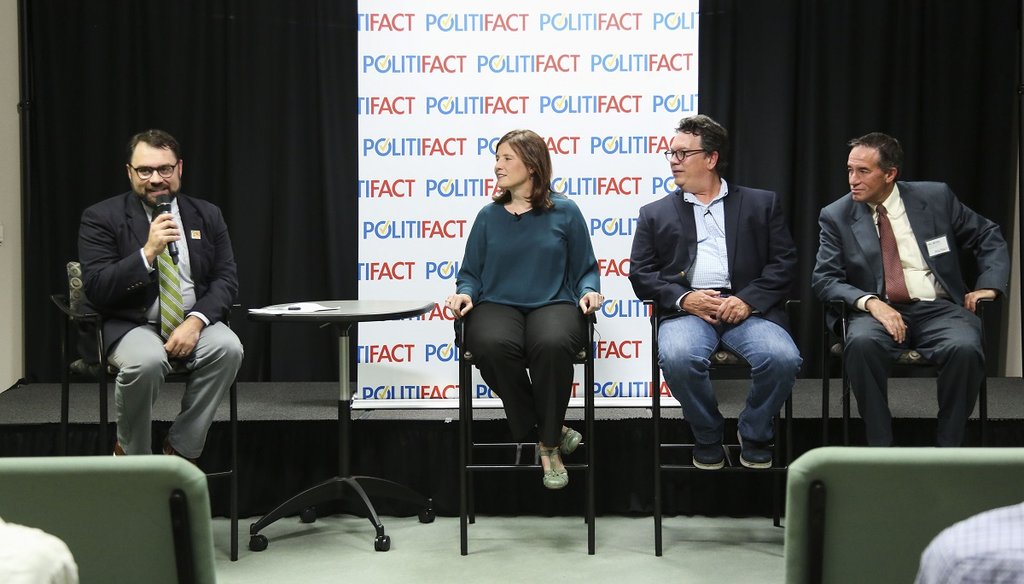Stand up for the facts!
Our only agenda is to publish the truth so you can be an informed participant in democracy.
We need your help.
I would like to contribute

(from left to right) Aaron Sharockman, Politifact Executive Director introduces a panel featuring Angie Holan, Politifact Editor, PolitiFact founder Bill Adair and Tampa Bay Times Editor Neil Brown at the Poynter Institute on August 22, 2017. (Times)
Bill Adair still remembers the moment when he realized his idea to fact-check politicians could turn into something big.
It was before PolitiFact launched in 2007, when Tampa Bay Times Web developer Martin Frobisher created the first design of the website's home page.
"I looked at it and it was so different and so clear to people that came to it what we were doing," Adair said Tuesday.
More than 13,000 fact-checks later, PolitiFact is one of the largest fact-checking organizations in the world, known for its six Truth-O-Meter ratings ranging from True to Half True to Pants on Fire.
Veterans of the organization — PolitiFact editor Angie Holan, Times editor and vice president Neil Brown and PolitiFact founder Bill Adair — were at the Poynter Institute on Tuesday night to discuss how PolitiFact got its start, and how it's sorting out fact from fiction in politics. Around 50 people attended the event held in honor of PolitiFact's 10th birthday.
The nonpartisan, independent fact-checking website was started by the Times. The Times is owned by the Poynter Institute, a nonprofit school for journalists.
PolitiFact executive director and event emcee Aaron Sharockman kicked off the discussion by asking Holan if lying and misinformation in politics has gotten worse during the last decade. Holan said in some ways it seems like the spin has gotten worse, but things also have gotten better because there's more fact-checking than ever.
"When we started PolitiFact, I had the hope, and I think Bill had the hope, that we would inspire other journalists to do more fact-checking," Holan said, "and that has absolutely come true."
When PolitiFact first started, it wasn't envisioned as a permanent fixture of the Times.
But the fact-checking website grew in popularity during the 2008 presidential election. In 2009, the website won the Pulitzer Prize for National Reporting for its coverage. Since then, PolitiFact's staff has grown, and there are partners in 11 states that check claims by governors, state legislators and members of Congress.
Brown compared fact-checking to going "back to the future," because it uses traditional reporting in an innovative way.
"The funny thing about PolitiFact all along is that it's the most old-school journalism you can find; you've just got to report it really well," Brown said.
The panel talked about how PolitiFact's mission is to empower democracy.
"We're not trying to get (politicians) to stop saying things that are wrong. That's up to them," Brown said. "What we're trying to do is to help you decide if what they're saying is wrong. That's sort of the difference, we put it in your hands. They're going to do what they're going do."
Our Sources
Field reporting
















































